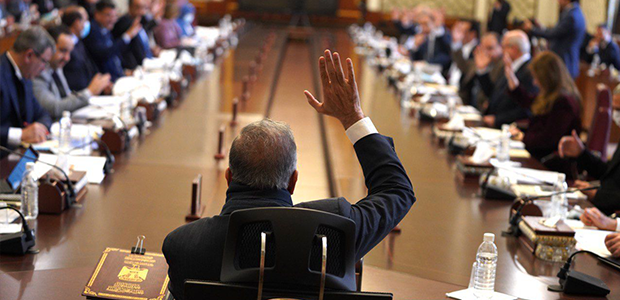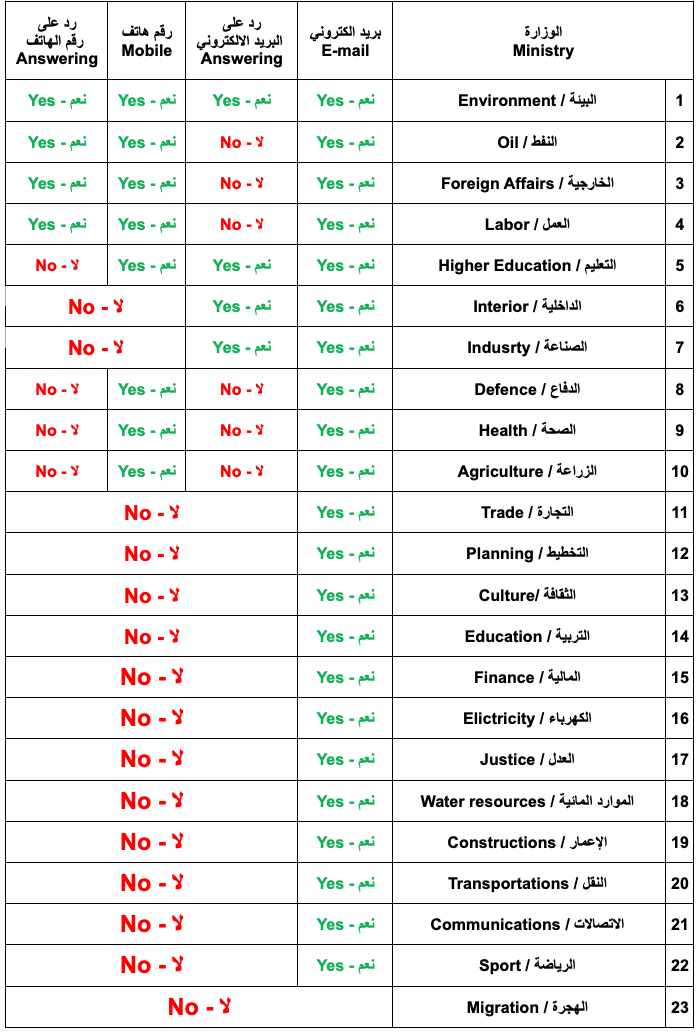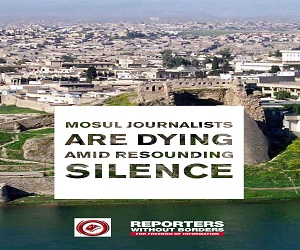
JFO team has checked the data on 23 websites of Iraqi government ministries to ensure there was a way to contact the ministry or that the phone numbers and email addresses listed on the websites actually worked.
JFO would like to call the attention of journalists and readers to the fact that the results of this research do not necessarily refer to the ministries that provide more or less information but rather attempt to track the websites of the ministries and the extent to which there are means of communication for journalists.
Mentioning the names of ministries that responded by phone or email does not necessarily imply that they provided information or an explanation to the press. The research team's goal was not to ask specific questions of ministries' employees but to `determine whether a tool is available to communicate with them.
Future research will be conducted to analyze the extent to which ministries engage with the right to information, as well as determine whether people responsible for communication with journalists from the ministries essentially have information to share or are permitted to do so. The current investigation's scope is limited and only examen the "functional ways of communication within the official websites of the ministries."
Results:
Out of the 23 ministries in the Iraqi government, it was found that only 8 of them provided both an email address and a phone number for contact. At the same time, the rest just posted an email address on their websites, except for one ministry that did not.
Eight ministries provided phone numbers and email:
The following eight ministries have shared phone numbers and email addresses on their websites:
1 - Ministry of Defense
2 - Ministry of Foreign Affairs
3 - Ministry of Oil
4 - Ministry of Higher Education
5- Ministry of Labor and Social Affairs
6 - Ministry of Health
7 - Ministry of Environment
8 - Ministry of Agriculture
Only messages and emails can be used to contact 14 ministries:
The following 14 ministries have only provided email addresses on their websites or they have enabled a message to be sent to the ministry without displaying an email address:
1 - Ministry of the Interior
2 - Ministry of Finance
3 - Ministry of Electricity
4 - Ministry of Justice
5- Ministry of Water Resources
6 - Ministry of Construction and Housing
7 - Ministry of Transport
8 - Ministry of Communications
9 - Ministry of Youth and Sports
10 - Ministry of Industry
11 - Ministry of Education
12 - Ministry of Culture
13 - Ministry of Planning
14 - Ministry of Commerce
There are no contact details for the Ministry of Immigration online.
The Ministry of Immigration and Displacement's website lacks any mention of a communication channel, giving the impression that it is closed off from the public and the media.
Only 4 ministries replied to messages.
Only 4 out of 22 ministries responded to emails after waiting more than 48 hours.
The ministries that responded to the emails are:
1 - Ministry of the Interior
2 - Ministry of Industry
3 - Ministry of Environment
4 - Ministry of Education
18 ministries did not respond to emails
Ministries that did not respond to messages or that the email addresses they published on their websites were ineffective:
1 - Ministry of Commerce
2 - Ministry of Planning
3 - Ministry of Culture
4 - Ministry of Education
5 - Ministry of Finance
6 - Ministry of Electricity
7 - Ministry of Justice
8 - Ministry of Water Resources
9 - Ministry of Construction
10 - Ministry of Transport
11 - Ministry of Communications
12 - Ministry of Sports
13 - MOD
14 - Ministry of Health
15 - Ministry of Agriculture
16 - Ministry of Foreign Affairs
17 - Ministry of Labor
18 - Ministry of Oil
JFO kept looking into the channels of communication with the Iraqi ministries. and JFO team called the numbers listed on the ministries' official websites, which were shared by the ministries.
4 ministries with out-of-service phones or no answer
Out of 8 ministries that have put phone numbers to contact them, the following ministries have been found out of service or unanswered:
1 - Ministry of Defense
2 - Ministry of Education
3 - Ministry of Health
4 - Ministry of Agriculture
4 ministries answer callers
As for the following four ministries, their employees responded to calls and declared their readiness to answer questions:
1 - Ministry of Environment
2 - Ministry of Oil
3 - Ministry of Labor
4 - Ministry of Foreign Affairs
A full mark for the Ministry of Environment
The Ministry of Environment was the only ministry that provided a phone number and email on its official website, and its employees answered phone calls and emails.
Most of the websites of the ministries are insufficient in terms of design and browsing speed, which indicates evident software problems, or bad server choices, which makes it difficult for any browser trying to obtain information or find
JFO recommendations
JFO is not surprised by Iraqi ministries' failure to provide means of communication for journalists or the general public, given that values such as the right to information are not given the attention or respect they deserve by Iraqi governments and its agencies.
Iraqi government departments have regularly expressed concern over the distribution of false or misleading material targeted at ministries or government officials. JFO would like to remind these organizations that specialists in the field of information and public opinion, as well as the United Nations, all agree that making it easier for journalists to get information is one of the most essential measures to combat misinformation.
The United Nations chartersو human rights conventions, the Iraqi constitution, and the Journalists’ Rights Law No. 21 of 2011 obligate "all state departments, the public sector, and other organizations to provide the facilities needed for a journalist to perform his job duties".
JFO calls on the directors and officials of the media departments in the ministries to start presenting plans to develop their departments from a technical point of view, in a way that matches the experiences of developed countries or even neighboring countries, to eliminate the issue of backwardness of Iraq's government websites.
Through ongoing reports and research, JFO will keep the public informed about how each Iraqi ministry and government institution is doing in terms of dealing with the press and media.







.jpg)



.png)





